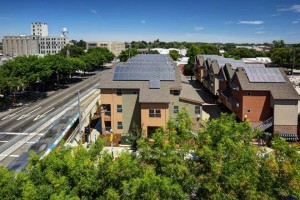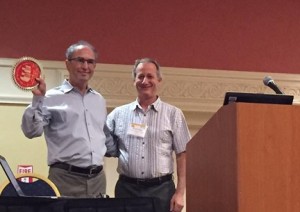New Buildings Institute (NBI) has played an active and influential role in building energy codes since the day its doors opened in 1997. Jeff Johnson, one of its first executive directors, was an ardent codes advocate with a long track record that included time at the California Energy Commission and director of the codes program at Pacific Northwest National Laboratory (PNNL).
Frustrated with the slow pace of progress on the ASHRAE 90.1 Standard, Jeff turned his focus to the commercial chapter of the International Energy Conservation Code (IECC), an area which had received little attention before that. Focusing heavily on commercial codes, Jeff was instrumental and an advocate in strengthening commercial building envelope requirements, including insulation and fenestration at PNNL. Despite push-back from product manufacturing groups, he was able to eventually push through provisions that included stricter glazing requirements for windows.
Jeff was hired at NBI based largely on his success in codes and made it an immediate priority at NBI. During this period, I became the leader of the Northwest Energy Efficiency Alliance’s (NEEA) energy codes initiative. I had no experience in the field and Jeff became my mentor, introducing me to people and explaining the sometimes arcane processes that govern the development of new codes and their later adoption by states. His enthusiasm and optimism were contagious and necessary for the challenges we faced. After a particularly concerning meeting with a government official who was assigned codes duties, unclear on entirely sure what codes were, I opined that we might have challenges working with this person. Jeff’s immediate response was “We’re all going to have to work together to make him a success!” In that moment, Jeff convinced me that we would.
Jeff’s death in 2005 did not stop NBI’s commitment to advancing energy codes. In fact, its greatest codes success came with the publication of the 2012 IECC. NBI – in particular then-executive director Dave Hewitt and then-consultant (now staff) Jim Edelson – worked tirelessly with The American Institute of Architects and U.S. Department of Energy to craft a major proposal for the commercial chapter which was based largely on the measures NBI had developed in its Core Performance Guide.
At the final development hearings, there were enough twists and turns, temporary disappointments, and intense 11th-hour negotiations to fill a novel. When the votes were finally tallied, however, we had triumphed and the results were spectacular: DOE’s analysis concluded that commercial buildings constructed under the 2012 IECC would use a whopping 25 percent to 30 percent less energy than those built under the 2006 version.
In recent years, NBI has been everywhere in the code development world, pushing not just for improvements in individual requirements but for major re-organizations of the entire code. Most recently, this took the form of proposing an entire new chapter for multifamily buildings in the IECC. While many people had complained about the inconsistent and illogical treatment of multifamily in the code, NBI was at the forefront of a group of organizations who actually presented a solution. And while the first attempt failed, it greatly raised awareness of all the problems and set the stage for successes in the future. It’s starting to take hold in local jurisdictions.
Other areas of major recent attention include improving the energy sections of the International Green Construction Code, helping create the existing buildings chapter of the IECC, and currently serving as an organizational member of ASHRAE 189.1. In addition, NBI leads the nation in developing stretch codes, including one scheduled to be adopted by the State of New York. Recently, DOE and NBI have been working together again on advanced cities-related codes work, creating a model stretch code 20 percent more stringent than ASHRAE 90.1-2013.

In 2016, DOE awarded Jim Edelson the Jeffrey A. Johnson Award for lifetime achievement for “a substantial contribution to increase energy efficiency by advancing building energy code requirements and performance” during his 20-plus years in the energy codes field.
For me personally, collaborating with NBI over many years has been a wonderful experience. The individuals are committed and caring, creative and forward-thinking. I look forward to many more years of working together in the future.
Note: To celebrate our 20th Anniversary we’ve invited David Cohan, Director of Technical and Policy Analysis at the Institute for Market Transformation (IMT), to share some of his experiences working on codes with NBI.
